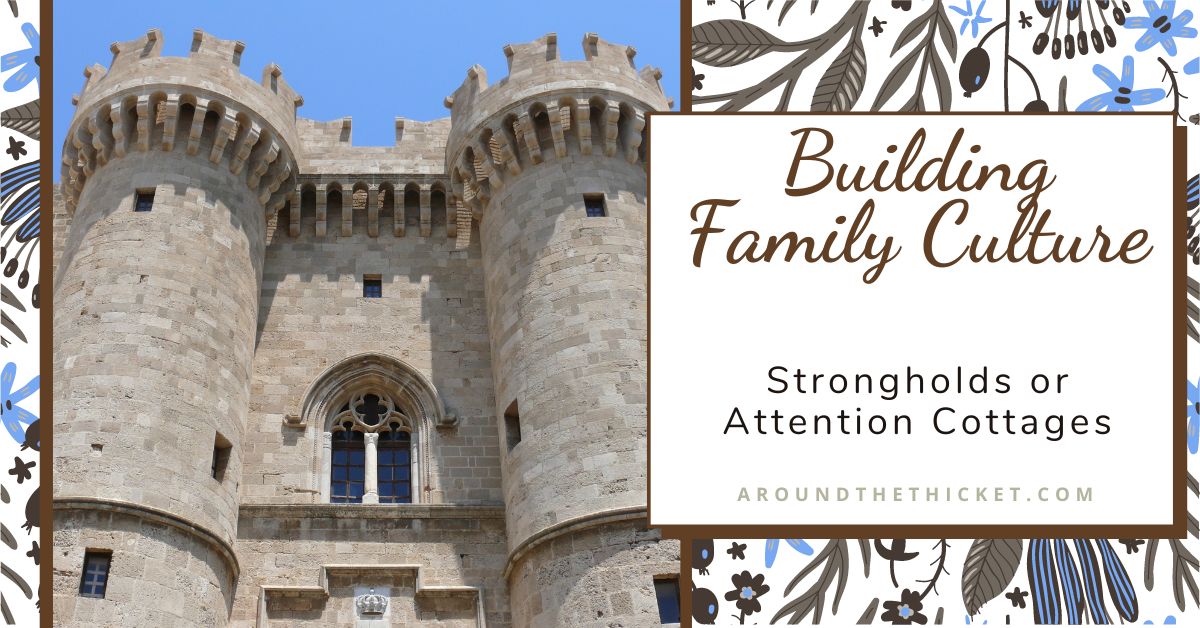Strongholds versus Attention Cottages
The attention cottage (a la Alan Jacobs) is an exciting metaphor. I think it’s something that many of us want: habits and homes that are marked by wisdom and contemplation of eternal truths, rather than by the sort of frenzied chaos that characterizes everything from our to-do list to social media. This comparison is worth closer consideration. What are we cultivating in our homes if we aren’t cultivating the practices of the attention cottage?
Mark Sayers suggests we are in danger of building not attention cottages but strongholds. This is an idea from his book A Non-Anxious Presence which, in itself, is a response to Edwin Friedman’s A Failure of Nerve. In it, Sayers argues we are in a cultural ‘grey zone’. This means that the authority and legitimacy of the institutions that we once looked to for purpose and security has passed away, and new rules, structures, and institutions have not yet taken their place. For example, as a culture, we have lost faith in our government and become sceptical about church and other institutions. This leaves us without a playbook to navigate the world. (I’m using ‘us’ and ‘we’ here in a broad, cultural sense rather than an individual one.)
Uncertain and doubting, the cultural response is one of anxiety – frantic searching for security and stability in a fast changing landscape. And in the perceived absence of anyone and anything to give us a sense of purpose, meaning, and security, the human response is to band together and build strongholds. Sayers writes,
“The stronghold is a biblical metaphor. A stronghold is a fortified area with strengthened walls. It can be reinforced by the natural defensive properties of geography, such as hills and high places, that keep the enemy and the evil out…Strongholds form when humans seek out or build a protective structure to find security, safety, and prosperity in a threatening, chaotic, and unpredictable environment.”
Building strongholds isn’t unreasonable, but in an anxious climate, they are built as a response to fear and anxiety instead of health and growth.
Stronghold: The Opposite of Attention Cottage
A stronghold, as Sayers defines it, is the opposite of an attention cottage. It is a reaction to the chaotic forces outside the walls. Instead of concern for the eternal, it focuses on immediate safety. Rather than a calm haven for thoughtful consideration, members are constantly asked to ‘say shibboleth’ in order to maintain their place within the group. Say the right thing or get pushed out into the danger that lies just outside the gates. Leadership of a stronghold becomes an exercise in keeping everyone happy. And by ‘everyone’, Sayers and Friedman mean the loudest and most immature voices in the group.
Strongholds sound a little dramatic, but most of us don’t need to go very far to find them. Perhaps we are even in them ourselves. I recognize the symptoms of strongholds that Sayers mentions here:,
“As a system overrun by anxiety becomes more reactive, it trends toward what Friedman labeled a herd instinct, in which ‘everyone will be emotionally fused with everyone else.’ This creates a dynamic in which ‘the desire for good feelings rather than progress will on its own promote togetherness over individuality.’”
Leading our Families with Nerve
So what about our families? If we want our homes to be attention cottages, we have to lead our children toward growth and away from immaturity. Leading in this way comes with challenges. Sayers again:
With the system rearranging itself to cater to the most emotionally unhealthy, those who wish to reflect, gain some distance to find perspective, or practice emotional health will pose a threat…Those wishing to chart a healthier direction will face tremendous pressure to adapt to the low emotional health that has captured the system.
These practices (reflection, gaining perspective, charting a healthy perspective) are the practices of attention cottages. And here we see they are threatening.
How so? On a very local level, the people in our family may feel threatened. We all want our children to be happy – no child wants to wait until Mom has made a thoughtful decision. They want ice cream Right Now. It’s a simple example, but prioritizing good feelings can escalate from getting ice cream to getting a smartphone. Will we bend to the pressure?
Friedman and Sayers would both encourage us to keep our cool. Risk dissatisfaction within the ranks and show some nerve. It’s not that we never say ‘yes’ to ice cream or even a smartphone, but that we make these decisions after having ‘gained some distance and found perspective’.
Of course, fear, reactivity, and anxiety may not only come from the children but from ourselves. One reason many people choose to home educate is a desire to avoid many of the messages being taught overtly and covertly in schools. This is a legitimate reason, if it is one reason of many. If it is the only reason, however, we risk building a stronghold out of our home. We aren’t orienting our families toward growth and a positive vision of education, but toward the dangers outside the gates.
Build an Attention Cottage by Building an Attention Cottage
This brings us right back to the idea of the attention cottage: we can’t cultivate our homes as attention cottages without implementing the practices of attention cottages. Jacobs points out that “to attend rightly to things eternal is the royal road to constructive thought and action in the temporal realm.” If we want to cultivate practices that establish our homes as places where families ponder eternal truths, we will have to step back from the chaos of social media, the news, and our never-ending to-do list and spend time pondering. To orient ourselves and our homes away from fear, discontent, and anxiety, we must get that perspective. To ponder the big questions. To take that ‘royal road’.
The obvious next question is, ‘how’? I want to spend more time on this, but it doesn’t need to be complicated. For starters, what about:
- Read and learn from people who cast a big, positive vision for what it means to live the good life. Think Charlotte Mason’s vision for education (or read her volume on personhood, Ourselves) or Andy Crouch’s The Life We’re Looking For or Alan Jacob’s How to Think or The Pleasures of Reading in an Age of Distraction. At the risk of seeming very trite, try the Bible.
- Read and learn far, far beyond topics that have direct application in your personal life. Go beyond the books on marriage and parenting. Cast a wide net. Read lots and lots of fiction.
- Make a point of talking to the people in your family about what you read. Narrate to them. It will hone your own attention and it will establish some of those family practices. Normalize breadth and depth in your family conversation.
Perhaps the most important step we can take, however, is to confess our fears to the One who has given us, not a spirit of fear, but of freedom. After all, is a stronghold is anything but a prison?
Want to find your feet with the Charlotte Mason Way?

Grab my eight day mini course on the Charlotte Mason Essentials when you subscribe to my newsletter. You’ll get daily emails, a mini podcast series, and a printable workbook with reading assignments and action steps. You’ll be on your Charlotte Mason journey in no time!






